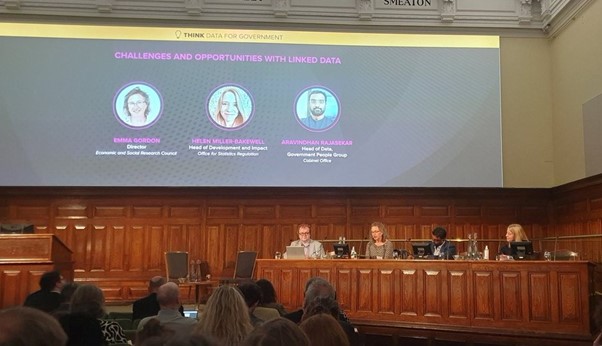
Harnessing the power of digital and data in government to make better decisions, improve service delivery and enhance user experience, is one of five reform missions for the Civil Service to improve how it works across government to serve the public more effectively. All Civil Service roles increasingly require data skills; whether that's designing policies or services, presenting information to others, managing workloads or leading teams to deliver exceptional results.
The Think Data for government event was a great opportunity to see how other parts of the Civil Service are tackling this mission (and of course, I logged the time for the Civil Service’s ‘One Big Thing’ initiative).
The event was framed as a ‘joined-up look at some key opportunities and challenges for public bodies and their suppliers’, and over the course of the day we heard from a number of exciting speakers and thought leaders in the data for government space, providing a fascinating window into the programmes and initiatives being undertaken at all levels of government.
Here are my key take aways from the day.
Dare to share
The theme that came again and again during the day was the increased willingness to both embrace data driven solutions to tackle challenges across government. Alongside that, there is also an increased appetite to share and pool data sources to enable better and faster decision making.
‘Dare to share’ was a common sentiment expressed across many of the presentations. This is the most exciting takeaway of the day for me. It showed me that the Civil Service is embracing the cultural shift that is essential to maximise the benefit of big data and AI (artificial intelligence).
That’s not to say we can throw caution to the wind on data sharing. Poor data stewardship will quickly see us lose our ‘license to operate’ from the public to collect, share and store their data. Finding the balance will be challenging, but the willingness to have these conversations is a critical early step.
AI and human-in-the-loop
Building on the idea of safeguarding and responsible use of data and tools was another key theme of the event. 2023 was a breakthrough year for AI globally, it’s on the agenda in a way never seen before. Human-in-the-loop is a concept which sees a need for humans to input into an AI model to accelerate and optimise its learning and output. This interaction can take a number of forms.
At the event, we learned how this concept was being used by Swindon council, who were piloting to use AI to develop accessible versions of their documentation for English as a second language, visually impaired and others with accessibility needs, with the result being reviewed by humans before release. It was one of the standout projects of the event and a great example of how AI and human oversight are both required to produce the optimum outcomes of many data and AI projects. I’m excited to see how that project continues to iterate and build on such a promising pilot.
Data as a product
As the opportunities and possibilities of data continue to grow exponentially, we must face up to the reality that we continue to operate in a financially constrained environment, and have a duty to deliver value for money to the public.
It was therefore very heartening to hear about the work being done in the Royal Air Force to treat and value data as a product, in order to identify their most valuable assets and projects, and certainly something I intend to follow up on. The importance of continually communicating and updating the value offering of any data ecosystem, product and service was also called out, as without continuous delivery of incremental value and continued buy in from key stakeholders and users, projects could slip into obscurity and obsolescence.
Data is not a magic bullet
Data has enormous potential in government, that much was made clear at this event. But just as important was the recognition that data is not a magic bullet, and also that careful groundwork must be laid. Being able to access data, analyse it, apply AI etc, all requires a proper set of standards around data structure, and the right infrastructure set up.
Without this, projects will struggle to get timely and comprehensive outputs from their data initiatives. Many of our cloud partners in government have spent some serious time thinking through these challenges, and there are many frameworks and tools now available at partners like AWS, GCP and Microsoft to help teams ensure projects have the foundations in placed to truly capitalise on big data initiatives.
Invigorated
That’s how I felt after 6 hours of talks and presentations about data and its potential across government. Many of the challenges and opportunities presented at the day are common across the civil service, and I will certainly be following up with a number of the speakers, to apply the lessons learned from their own experiences onto similar projects I am currently working on here at the ONS.
Collaboration is something we encourage in the civil service, and for good reason. It is arguably even more important in the context of data projects, where no one department or team is likely to own all the data needed for the project to succeed.
As a data intensive organisation, I believe the ONS is well positioned to be thought leaders in this space, and I look forward to seeing the ONS showcasing some initiatives like the Integrated Data Service at future events.
So, lots to look forward to in 2024. I hope to get a chance to meet many more of you and learn how you are tackling the challenges and opportunities of data and responsible use of AI at future events.
1 comment
Comment by Kirsty Rhodes posted on
Great post Matthew!